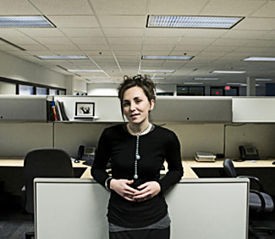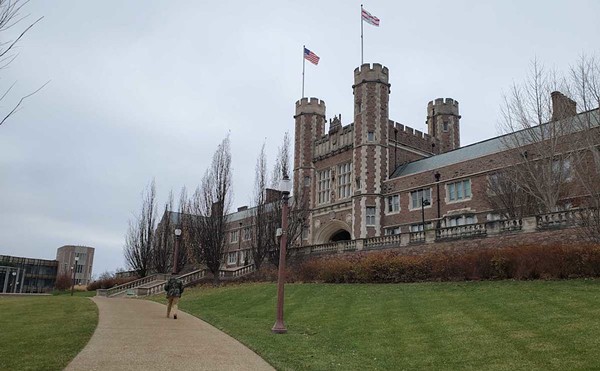Not much has changed since Riverfront Times reported on the school dropout crisis back in January of 2009. Since 2004, the high-school graduation rate in the St. Louis public schools has slid from 61 percent to 45 percent, 30 percentage points below the average for the state of Missouri. Nobody's found a magic solution to keep kids in school, but that doesn't mean that people still aren't spending lots of money trying to figure it out.
Latest up is the Bill and Melinda Gates Foundation, which has partnered with the Corporation for Public Broadcasting and the America's Promise Alliance on a new project, American Graduate: Let's Make it Happen. The first order of business was sponsor a series of town hall meetings to discuss the dropout crisis with teachers on the front lines, to be broadcast on PBS. The first meeting was held Monday night at the KETC-Channel 9 station in Midtown. Approximately 100 St. Louis public school teachers attended, along with Stephanie Krauss president and CEO of Shearwater, a high school for dropouts; and Barrett Taylor and Celeste Adams, teachers at Metro and Riverview Gardens High Schools, respectively. StoryCorps, the NPR oral history project, was also on hand, collecting the teachers' stories.
Teachers, as anyone who has ever spent more than a couple of days in school knows, are used to holding forth at great length. It was up to the moderator, Gwen Ifill, to keep things moving along. (Ifill joked that the discussion may have been more contentious than the last debate she moderated in St. Louis, the 2008 vice-presidential debate, though back then she was hampered by a broken ankle.)
It was generally agreed that students drop out because they don't feel that school serves much of a purpose in their lives.
"We have to find out why students come to school," said Judge Jimmie Edwards, founder of the Innovative Concept Academy at Blewett Middle School. "Some come because they're hungry and they get a free lunch. Some come because they're cold. Some come because school is a safe place. They're not always there to learn."
Teachers agreed that students were distracted by problems at home. Taylor declared that there needed to be more discussion of poverty and racism, and also more sex ed in the schools, in order to teach kids ways to avoid becoming teenage parents.
One high-school English teacher contended that students drop out because they're bored. "We have to use phonics to make sure they know how to read," she said. "They know how to read and they're so excited. Otherwise, the problem is that they drop out in second grade and hang out for eight more years."
Added another teacher: "There's such a focus on multiple-choice tests instead of loving learning. The kids are bright. They don't want to answer meaningless questions to make someone in Washington or Jefferson City feel good about themselves." (This garnered the loudest round of applause of the night.)
Even the students who want to learn may not have the resources. One teacher who had been part of an exchange program in England noted that even though her school was in a poor neighborhood, it, like every other school, was still equipped with sufficient notebooks, writing utensils, chalk and computers. Back the U.S., teaching in a comparable school in a comparable neighborhood, she found herself paying for those things out of her own pocket.
Periodically during the discussion, Ifill took polls among the teachers, via text message. Even she seemed surprised to learn that 55 percent of the teachers believed the larger community wasn't involved in what went on in the schools. Unfortunately, the students are distracted by what goes on in the community. "How do you expect a student to pay attention when there's been a shooting in the neighborhood the night before?" one teacher asked.
"Students have to learn despite shootings," Krauss told her. "The role of school leaders is to know who in the community they need to get involved." Krauss pointed to her own experiences as a social worker, which taught her that there are plenty of social service organizations in the city that are able to give help to kids who need it. Unfortunately, a lot of teachers and administrators don't know those resources are there.
Another teacher, who had received a grant from the Danforth Foundation to improve her school's science curriculum, urged her fellow educators to look for private donors.
In the end, nothing was resolved. It wasn't even clear, judging from the expressions on the teachers' faces, if anyone felt any better, let alone had a clue what to say or do the next time a kid disappears from the classroom forever.







